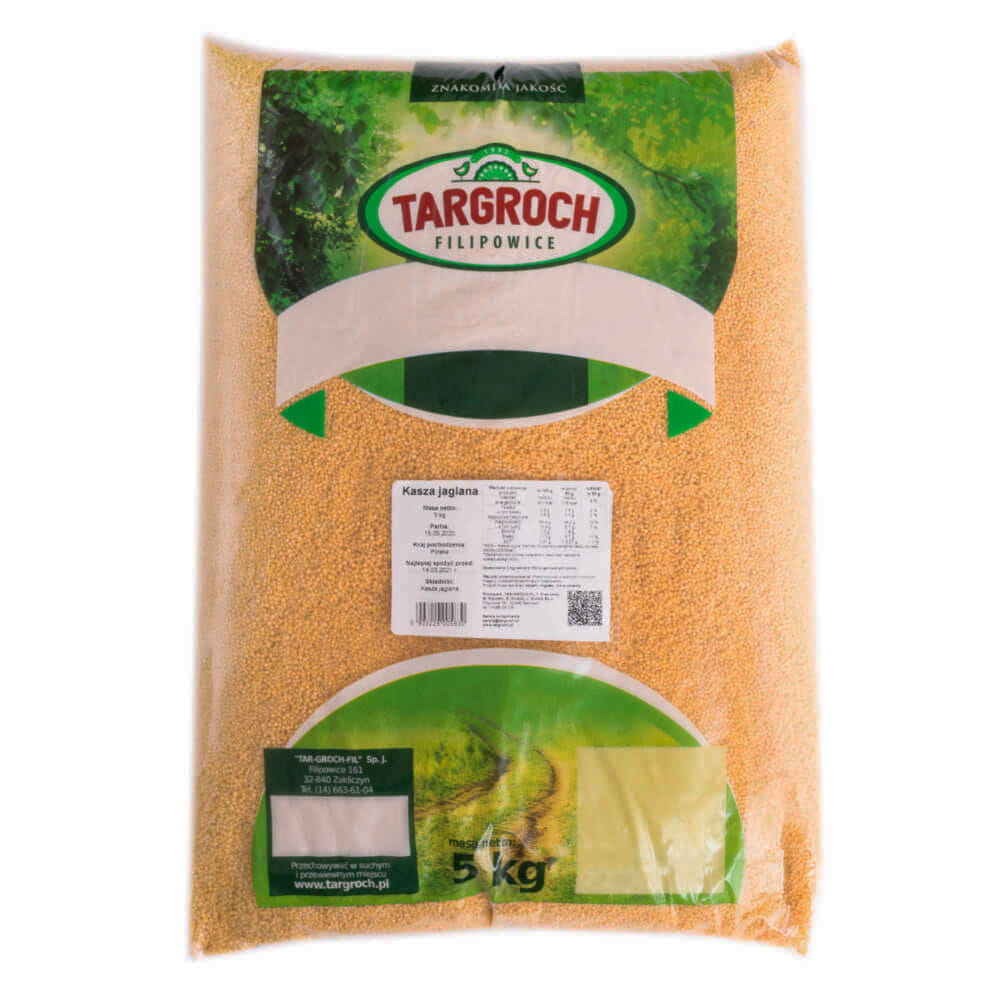Millet 5 kg TARGROCH
- Regular price
- €10,10
- Regular price
-
- Sale price
- €10,10
- Unit price
- per
Couldn't load pickup availability
Description
xDESCRIPTION
- Source of protein and fiber
- high content of iron and B vitamins
- easily digestible
Millet is considered the oldest groats. It is obtained from millet seeds, which have been cultivated since Neolithic times by peeling the grains of this grain.
Millet is low in starch but high in easily digestible protein. It is characterized by the highest content of B vitamins: B1 (thiamine), B2 (riboflavin) and B6 (pyridoxine), as well as iron and copper. It is easily digestible and does not cause allergies as it does not contain gluten.
Millet contains silica, which has a beneficial effect on hair, skin and nails. Silicon also plays an important role in bone mineralization and metabolism. Millet also provides large amounts of vitamin E and lecithin, which has a positive effect on memory and concentration.
INGREDIENTS
millet p>
Net weight: 5 kg
Nutritional value of the product per 100 g:
Energy value - 1488 kJ / 351 kcal
fat - 2.9 g
- including saturated fatty acids - 0.6 g
Carbohydrates - 68.4 g
- including sugar - 13.4 g
Dietary fiber - 3.2 g
Protein - 11.3g
Salt ** - 0.01 g
Vitamins and minerals per 100 g (% NRV*):
Iron - 4.8 mg (34%)
Zinc - 3.4 mg (34%)
Magnesium - 100 mg (27%)
Natural deviations possible.
**Salinity is due to natural presence only.
* NRV – nutrient reference values for an average adult (8400 kJ / 2000 kcal). p>
APPLICATION
The millet should be rinsed with and in my water. Cook in salted water in the ratio of 1 cup of porridge to 2 cups of water. Remember not to stir the groats while cooking. If you have a thick-bottomed saucepan, you can remove it from the heat sooner and the semolina will be covered in minutes.
INFORMATION ABOUT ALLERGENS
The plant also packs: sesame, almonds, products containing gluten, various nuts. Despite all efforts, the presence of these raw materials in the product cannot be 100% ruled out.
STORAGE
Store in a dry and cool place in a sealed package.
similar products
- Regular price
- €10,10
- Regular price
-
- Sale price
- €10,10
- Unit price
- per
- Regular price
- €10,10
- Regular price
-
- Sale price
- €10,10
- Unit price
- per
- Regular price
- €10,10
- Regular price
-
- Sale price
- €10,10
- Unit price
- per
- Regular price
- €10,10
- Regular price
-
- Sale price
- €10,10
- Unit price
- per
- Regular price
- €10,10
- Regular price
-
- Sale price
- €10,10
- Unit price
- per
- Regular price
- €10,10
- Regular price
-
- Sale price
- €10,10
- Unit price
- per
- Regular price
- €10,10
- Regular price
-
- Sale price
- €10,10
- Unit price
- per
- Regular price
- €10,10
- Regular price
-
- Sale price
- €10,10
- Unit price
- per
- Regular price
- €10,10
- Regular price
-
- Sale price
- €10,10
- Unit price
- per
- Regular price
- €10,10
- Regular price
-
- Sale price
- €10,10
- Unit price
- per
Recently Viewed Products
- Regular price
- €10,10
- Regular price
-
- Sale price
- €10,10
- Unit price
- per
- Regular price
- €10,10
- Regular price
-
- Sale price
- €10,10
- Unit price
- per
- Regular price
- €10,10
- Regular price
-
- Sale price
- €10,10
- Unit price
- per
- Regular price
- €10,10
- Regular price
-
- Sale price
- €10,10
- Unit price
- per
- Regular price
- €10,10
- Regular price
-
- Sale price
- €10,10
- Unit price
- per
- Regular price
- €10,10
- Regular price
-
- Sale price
- €10,10
- Unit price
- per
- Regular price
- €10,10
- Regular price
-
- Sale price
- €10,10
- Unit price
- per
- Regular price
- €10,10
- Regular price
-
- Sale price
- €10,10
- Unit price
- per
- Regular price
- €10,10
- Regular price
-
- Sale price
- €10,10
- Unit price
- per
- Regular price
- €10,10
- Regular price
-
- Sale price
- €10,10
- Unit price
- per
- Choosing a selection results in a full page refresh.











